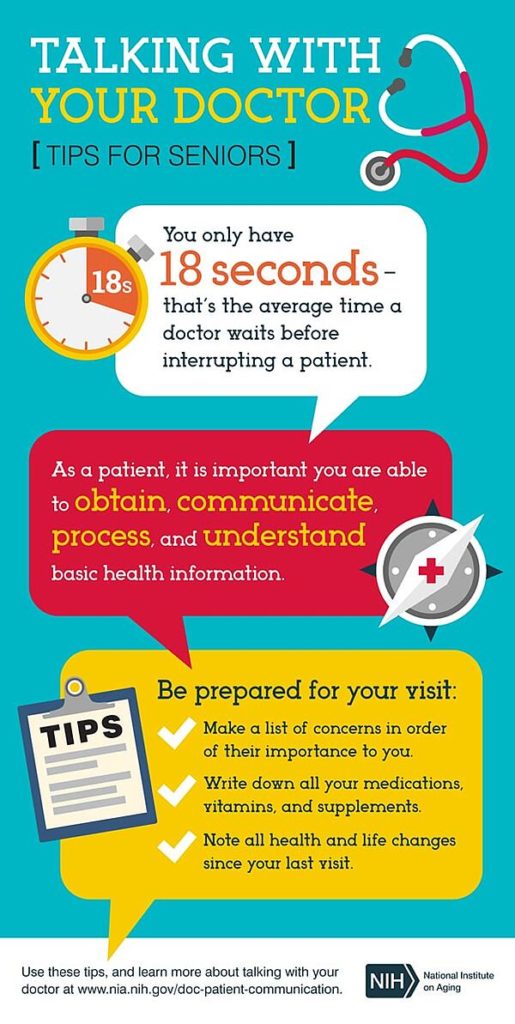How many times have you gone to the doctor and forget one or more of the concerns you wanted to talk about? You’re not alone, but there are plenty of ways to make the most of each appointment simply by getting organized and planning ahead. Here are a few of the best tips for productive doctor visits.
Tips for Productive Doctor Visits
Choose a doctor that makes you feel comfortable and confident.
Perhaps the most important aspect of getting the most from your doctor appointments is to choose a doctor who makes you feel they care. It’s easy to become lost in the assembly-line medicine we have come to expect, but once you’re with the doctor, you should feel like the center of attention. When looking for a new doctor, ask friends and family who they see, why they like them and what if any problems they have had with the doctor or their staff. If your doctor is retiring or moving, you can also ask them for a recommendation. While looking, be sure to consider each doctor’s area of practice (such as primary care, geriatric, etc.) to be sure your health care needs are in line with their expertise. For a step-by-step guide to choosing a doctor, the National Institute on Aging explains it all in the article, “How to Choose a Doctor You Can Talk To.”
Choose a doctor who accepts your insurance.
When choosing a doctor, don’t forget to find out if the doctor or practice accepts your health insurance. If you’re on Medicare, the website Physician Compare is a great resource for searching in your area by name, specialty, group, or body part. If you have private insurance you can call the doctor’s office and ask them if your plan is accepted. You can also visit your insurance company’s website for plan-specific information. If you have insurance through the Healthcare Marketplace you can check your coverage on the website, call 1-800-318-2596, or find local assistance to contact for help.
Be prepared.
Keeping a list of ailments and other health complaints or questions is the best way to be sure all of your concerns are addressed with your doctor. During the time period between appointments use the handy worksheet from the NIA to keep track of issues. Don’t hesitate to write down even seemingly unimportant things as they may mean more to your doctor than they do to you. Also important is to write down everything your doctor tells you whether is just for information purposes or something your doctor wants you to do. Any doctor’s appointment is wasted when you can’t remember or just don’t follow doctor’s orders.
Be open and honest.
Once you have a doctor you really like, build on that relationship by being honest about how you’re feeling. Are you struggling with your diet? Have you experienced any sudden or unusual physical changes like lumps, swelling or rashes? Are you depressed or anxious? These are just a few of the issues that your doctor wants and needs to know about if they are going to provide quality care. It’s human nature to feel embarrassed about discussing poor health or perceived shortcomings, but doctors are human too and they have heard it all. Don’t let embarrassment cost you your health and quality of life. To learn more about talking to your doctor, the AARP’s article, “How to Talk to — and Understand — Your Doctor” is a great place to begin.
Bring a list of all medications including supplements.
Your medications are key to further treatment and your doctor needs to know exactly what you are taking, how often and the doses. This is especially important if you see more than one physician for different medical concerns such as a cardiologists, urologist or other specialists. Keeping an updated list of your medications is easier with the NIA’s drug tracking worksheet that is available as a pdf to print. As you are compiling your list, be sure to include supplements you take occasionally or regularly. Even “natural” supplements can interact with prescribed medications causing a range of complications, just like different prescribed drugs can interact with each other. The U.S. Food & Drug Administration spells it out clearly in the article, “Avoiding Drug Interactions.”
Don’t go it alone.
If you need help hearing or understanding the doctor, or if you have memory problems, it’s a good idea to take a friend or relative with you to make sure you explain all of your concerns, ask all your questions and get the answers you need to stay well. Show this person your worksheets, share with them any problems you are having and ask them to help you take notes during your appointment. Enlisting the assistance of someone with a medical background or experience with elder care is especially helpful. If you want to discuss personal topics with your doctor, let your helper know so they can step out during that time. Even if they don’t come in the examining room with you, they can join you and the doctor when it’s time for talking.
 Source: National Institute on Aging
Source: National Institute on Aging
There are many ways to make the most of your visits to the doctor, and you can find out more in the NIA publication, “A Guide for Older People – Talking with Your Doctor.” This 44-page guide also contains worksheets like those above to help you be prepared, as well as resources for everything from exercise to advance directives to sexuality. Start today to make your next doctor’s visit the most productive yet.
For information about Countryside, call Margaret Nagel at (517) 206-5000 or download our brochure to learn about our care levels, cost, and amenities.


